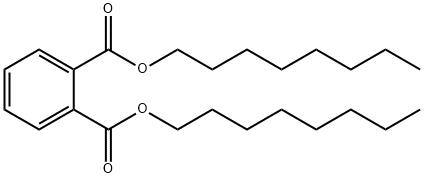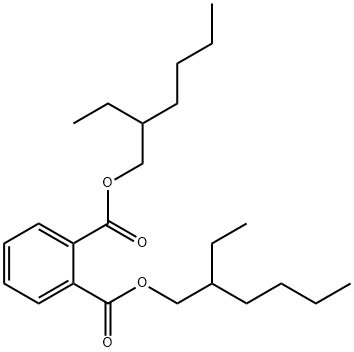A3183712
Di-n-octyl phthalate , standardforGC,≥99.0%(GC) , 117-84-0
Synonym(s):
DNOP;Phthalic acid di-n-octyl ester
CAS NO.:117-84-0
Empirical Formula: C24H38O4
Molecular Weight: 390.56
MDL number: MFCD00015292
EINECS: 204-214-7
| Pack Size | Price | Stock | Quantity |
| 5ML | RMB41.60 | In Stock |
|
| 25ml | RMB108.80 | In Stock |
|
| others | Enquire |
Update time: 2022-07-08
PRODUCT Properties
| Melting point: | -25℃ |
| Boiling point: | 380 °C |
| Density | 0.980 g/mL at 20 °C(lit.) |
| vapor pressure | 5(x 10-8 mmHg) at 82 °C, 500 at 132 °C (Gross and Colony, 1973) |
| refractive index | n |
| Flash point: | 219 °C |
| storage temp. | 2-8°C |
| solubility | Chloroform (Slightly), Methanol (Slightly) |
| form | Oily Liquid |
| Specific Gravity | 0.98 |
| color | Colourless |
| Water Solubility | Insoluble in water. |
| Merck | 14,2864 |
| BRN | 1915994 |
| Henry's Law Constant | 1.41(x 10-12 atm?m3/mol) at 25 °C (approximate - calculated from water solubility and vapor pressure) |
| Dielectric constant | 5.1(24℃) |
| CAS DataBase Reference | 117-84-0(CAS DataBase Reference) |
| NIST Chemistry Reference | Di-n-octyl phthalate(117-84-0) |
| EPA Substance Registry System | Di-n-octyl phthalate (117-84-0) |
Description and Uses
DNOP is a liquid. Molecular weight= 390.62;Boiling point = 230℃ under 5 mmHg; Flash point = 215℃;Autoignition temperature= 390℃. Explosive Limits:LEL = 0.3% at 245℃; UEL—unknown. HazardIdentification (based on NFPA-704 M Rating System): Health2, Flammability 1, Reactivity 0. Insoluble in water.
Dioctyl phthalate is used as a plasticizer in various plastic materials.
Safety
| Symbol(GHS) |   GHS07,GHS08 |
| Signal word | Warning |
| Hazard statements | H413 |
| Precautionary statements | P273-P501 |
| Risk Statements | 60-61 |
| Safety Statements | 23-24/25 |
| RIDADR | 2810 |
| WGK Germany | 2 |
| RTECS | TI1925000 |
| TSCA | Yes |
| HS Code | 29173200 |
| Hazardous Substances Data | 117-84-0(Hazardous Substances Data) |
| Toxicity | Acute oral LD50 for mice 6,513 mg/kg (quoted, RTECS, 1985):rats 13,000 mg/kg (Dogra et al., 1989):mice 1,250-1,954 mg/kg (Etnier, 1987). |


